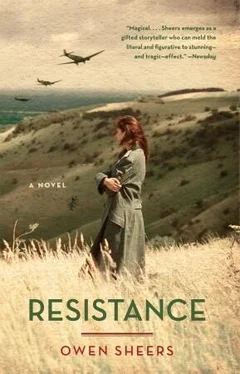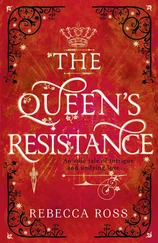Back in the house Emma filled her lungs behind her mother and launched into another rising scale of cries. Menna winced and frowned over her shoulder into the hallway. Again Maggie said nothing more than ask if she’d seen William or Tom about. No? Well, not to worry, she said, stroking and pinching at Tudor the same way she might pet a dog or one of her horses. If she saw Jack she’d tell him his tea was cold. And she’d bring some of those old toys of her boys round for Tudor. She’d been meaning to for ages. No, of course she would, no trouble. She didn’t really want them around the house anyway.
They’d left The Firs, Emma’s cries dulling behind them as her mother closed the door of the farmhouse, and walked back down onto the track. If they turned right it would lead them all the way back to Upper Blaen. Turn left and it led out towards the mouth of the valley, gradually becoming a lane as it emerged from under the shadow of the slope and only evolving into a proper tarred road eight or nine miles further on, once it was free of the valley altogether.
Maggie was quiet as they walked away from The Firs. She picked leaves from the hedge and kept her head down as if looking for something in the soft rutted mud beneath her feet. The blackberries were beginning to ripen, swelling from tight red clusters into claret dark bunches. Sarah wanted to stop and pull at the ripest ones, but Maggie’s pace had quickened and she was walking ahead. Sarah jogged a couple of strides to draw level with her.
“So, what d’you think?”
Maggie stopped in the lane. The light rain had passed and the sun through the leaves dappled across her face, making her squint when the breeze shifted the shadows from her eyes.
“I think I was right, Sarah, that’s what I think. They’re up t’something. All of them. They’ve gone somewhere. The bloody fools,” she added with a shake of her head.
“But where’d they go? The leaflets all say stay put. And the radio. And they can’t leave the farms for long, can they?”
“I don’t know, bach. You’re right, they can’t leave the farms for long.” Maggie paused, looking back down at her feet. “But they’ve left us, haven’t they?”
Sarah shook her head again, the notch between her eyebrows deepening. “They haven’t ‘left’ us. They’ve just gone somewhere. They’ll be back soon enough. I know Tom, he won’t be gone for long.”
“An’ I know William,” Maggie said, looking back up at Sarah. “He’s never left the cows unmilked. Never. He’s been milking cows every morning since he was a lad. An’ he’s never done anything I didn’t know about first.”
Maggie made this last assertion with some pride, and Sarah wondered if this wasn’t all just about her unease at being usurped by William, who, it was true, rarely moved from the house without Maggie’s blessing or knowledge.
“We should get together,” Maggie said. “Mary will start worrying. As soon as Bethan’s back and she hasn’t got Hywel in tow.”
“But she might. Have found him, I mean.”
Maggie looked hard at Sarah. Don’t be so stupid, girl. Grow up. That’s what she wanted to say to her. Snap out of your dreams, your pretty life. What do you know? You’ve never lost anyone. This is war. Things happen. Don’t you realise, everything’s different now. Don’t you know what happened in France? In Holland? Belgium? Even Russia? Things happen. Even here, things happen. But she didn’t say this to Sarah. She just nodded her head instead, said, “Hmm, yes, she might,” and started walking on again, still talking, but more to herself than to Sarah, “but I still think we should get together an’ talk. Just in case, isn’t it?”
Sarah didn’t object again. She knew better than to question Maggie more than once.
“So,” Maggie continued, quickening her pace again and throwing her handful of leaves away, “why don’t you go back and tell Mary t’come up to ours. An’ tell Bethan to go over t’The Firs. She can take care of Tudor an’ Emma so Menna can come over too. Actually, you’d better go to Menna first, let her know. Gently, mind.”
“And what are you going t’do?” Sarah asked.
“I’m going down to t’The Court. See if Reg and the boys are there,” Maggie answered. “An’ then I’m going to milk those bloody cows,” she added, striding on, leaving Sarah standing in the middle of the track.
A magpie, disturbed by Maggie, flew from a tree leaning over the track ahead of her. “One for sorrow,” Sarah thought, hearing her mother’s voice again. She looked around for the second bird that would make that curse a blessing. But it wasn’t there. And once Maggie had rounded the bend in the track, neither was anything else.
That had been over an hour ago. And now here they were, the four of them, sitting around Maggie’s kitchen table listening to her as she explained to Menna once more that their husbands might be gone for a while. For more than just a day. They’d tried the wireless, but it hadn’t told them anything. The fighting in the south continued. The Allied forces were resisting the German counterattack. The population along the south coast had been evacuated north. America had pledged more reinforcements, but the U-boats in the Atlantic were sinking two ships out of every three. Japan was making advances in the Pacific. And then the signal had gone, fuzzed and whined out into static as it so often did, blunted by the hills that surrounded them.
“So what d’we do?” Mary asked when Maggie had finished. Menna’s eyes had begun to fill and Mary’s voice had a different, harder tone to it. One Sarah hadn’t heard before.
“Well, carry on, I suppose,” Maggie said. “Tha’s all we can do, isn’t it? Carry on, keep everything going.”
“It doesn’t make sense,” Menna said, her voice thick with suppressed tears and muffled under the handkerchief she held over her mouth. “It doesn’t make any sense.”
Maggie put a hand on her shoulder but carried on talking to Mary. “I don’t know about The Court, though.”
When Maggie had gone to call on Reg and his boys at Olchon Court she’d found the morning’s pattern complete. Reg had no wife to leave behind, so Maggie had simply found the old house empty. The Court sat a mile or so further down the valley’s western wall than Maggie’s farm. It was a square, solid building, a fourteenth-century fortified farmhouse with walls several feet thick and initials carved into its pitted beams by boys over seven hundred years dead. Reg Powell had inherited it from a long line of fathers and sons. When his wife died he carried on living at The Court with his own two boys, Malcolm and John. Malcolm had been born with a club foot, so, given The Court’s large acreage, John had been allowed to stay to help his father run the farm. But this morning Maggie had found the place deserted, the sun flashing off the diamond-shaped panes in the higher windows and the chickens roaming the lawn, picking at the flowerbeds. It was The Court that made her sure. Every man in the valley had gone. Last night there were seven of them here. With their pipes and their cigarettes, with their caps, their boots, their rare laughter, their wind-weathered faces, and their earth-hardened hands. But this morning there were none. It was as if the valley had experienced its very own Passover and they, the women, had somehow been left untouched by whatever dark angel had visited in the night and taken their men.
“We can’t cope with everything on our own. There’s no way.” Mary was hardening against Maggie’s assumed authority.
“Yes we can,” Maggie said. “Of course we can. The dipping’s done, isn’t it?”
“And it won’t be for long,” Sarah said.
The two older women looked down the table at her but said nothing.
Читать дальше












